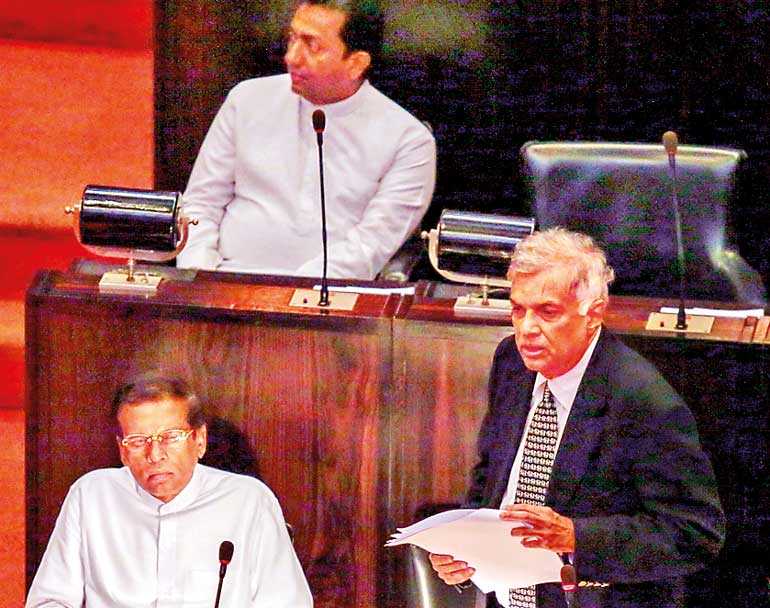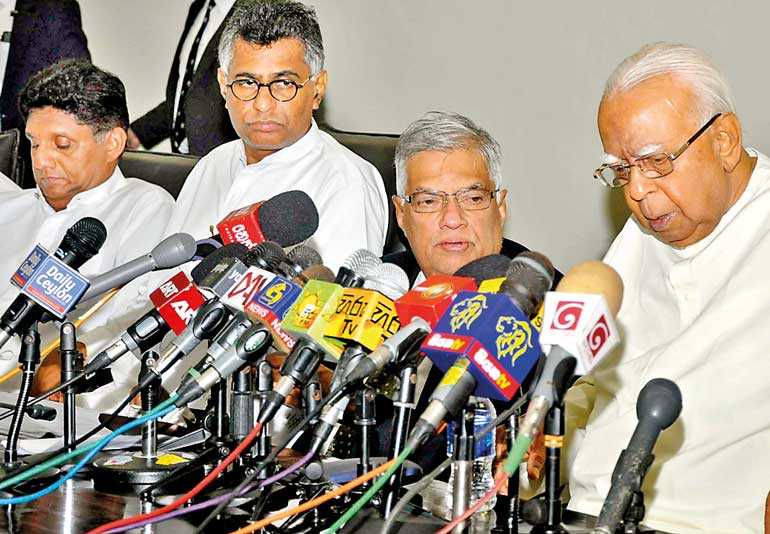Friday Feb 27, 2026
Friday Feb 27, 2026
Wednesday, 11 March 2020 01:29 - - {{hitsCtrl.values.hits}}
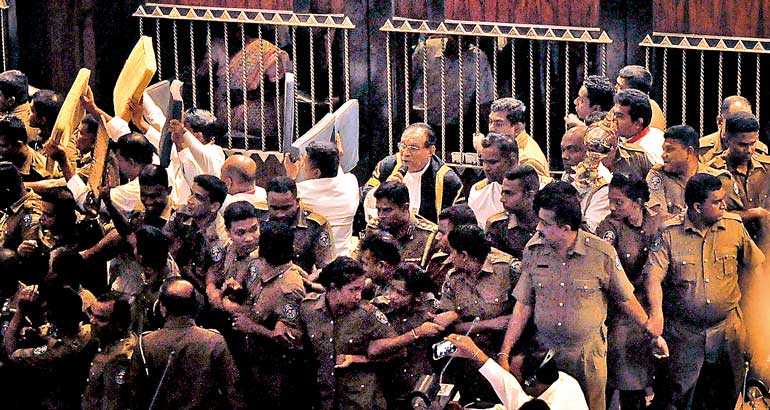
For the Speaker and for Parliamentary democracy, it was a day of victory
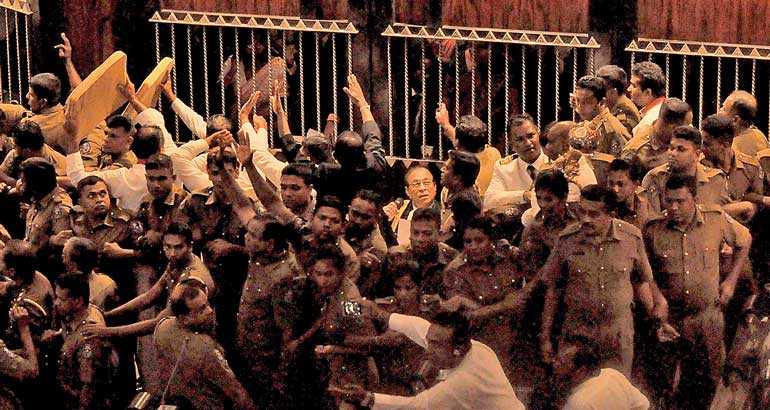
The Speaker stood his ground
By Chandani Kirinde
When Ranil Wickremesinghe took the floor of the House to congratulate Karu Jayasuriya on his appointment as the Speaker of the Eighth Parliament of Sri Lanka on 1 September 2015, he described it as a “historic occasion,” the beginning of a great experiment in the country’s system of governance where the two main parties would work together to take the country down a new path by breaking away from bickering on party lines, a practice that had plagued the country since independence.
It was a day filled with goodwill with many heaving a sigh of relief that the authoritative control over the last Parliament that Mahinda Rajapaksa exercised with a two-thirds majority was finally broken.
The 19th Amendment to the Constitution had been overwhelmingly approved by the House on 28 April with 215 of the 225 Members of Parliament (MPs) voting in its favour after the astounding victory of Maithripala Sirisena at the Presidential Election held in January that year.
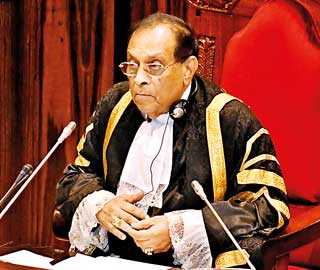 |
|
Speaker Karu Jayasuriya |
It was the most significant amendment to the 1978 Constitution to be passed by Parliament, reducing executive powers of the President and strengthening the hand of the Legislature. The Amendment stripped the President of powers to sack Parliament after one year of an election and instead replaced it with provision to enable the President to dissolve Parliament only after four and half years of its first meeting.
The term of office of both President and Parliament were also reduced from six to five years. It was a major shift from what had transpired under the Rajapaksa administration which had used its large majority in the House to push through the Eighteenth Amendment to the Constitution to further consolidate the powers of the Executive by doing away with the two term limit on holding office.
One of the first tasks for the new Parliament was picking a MP to be Leader of the Opposition and it was here that there were signs early on that the pledge by the then-newly elected President to build a “consensual political tradition” was not well received by all the members of the United People’s Freedom Alliance (UPFA), the leadership of which he had taken over after his victory.
With the UNP and the UPFA now both in Government ranks, it was Tamil National Alliance (TNA)’s Parliamentary Group leader Rajavarothiam Sampanthan who was named Leader of the Opposition. His appointment was confirmed by the Speaker after the UPFA did not stake a claim to the post even though more than 50 MPs refused to join the Sirisena-Wickremesinghe Good Governance (Yahapalanaya) Government. So the TNA with 16 MPs became the main Opposition party in the Eighth Parliament and JVP Leader Anura Dissanayake, whose Party had six seats in the House, was appointed the Chief Opposition Whip, an aberration no doubt given that those from the UPFA who had chosen to sit in Opposition outnumbered the TNA and JVP put together.
An uneasy arrangement
It was an uneasy Parliamentary arrangement from the start with once sworn political adversaries now seated on the same side of the House and trying to work together to build on the pledge to strengthen Parliamentary democracy. Ironically all the UPFA MPs in Government ranks were ones who had worked against Sirisena in the Presidential Election but as politics goes, many had abandoned the sinking Rajapaksa ship with the unexpected change in fortunes.
was an uneasy Parliamentary arrangement from the start with once-sworn political adversaries now seated on the same side of the House and trying to work together to build on the pledge to strengthen Parliamentary democracy. Ironically all the UPFA MPs in Government ranks were ones who had worked against Sirisena in the Presidential Election but as politics goes, many had abandoned the sinking Rajapaksa ship with the unexpected change in fortunes. For a while it did look like the odd arrangement could work out. Within a year of coming to power, the Government enacted the Right to Information Act which had been in the making since 2004 followed by other important pieces of legislation such as the Office for Mission Persons (OMP) and the Office for Reparations Acts as well as the Assistance to and Protection of Victims of Crime and Witnesses A
For a while it did look like the odd arrangement could work out. Within a year of coming to power, the Government enacted the Right to Information Act which had been in the making since 2004 followed by other important pieces of legislation such as the Office for Mission Persons (OMP) and the Office for Reparations Acts as well as the Assistance to and Protection of Victims of Crime and Witnesses Act . These were among the total of 124 Bills passed by the Eighth Parliament. Standing Orders of Parliament too underwent significant amendments during this period which saw the introduction of Sectoral Oversight Committees as a means of getting MPs more involved in the legislative process.
But trying to hold together two political parties with different ideologies was no easy task and it did eventually lead to the failure of the grand Yahapalanaya experiment – but not before testing Parliamentary democracy in the country to its very limits.
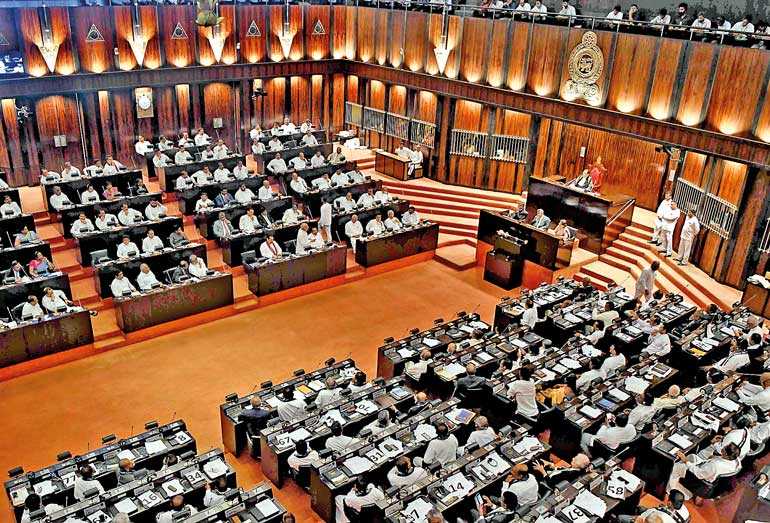
The President’s Prime Minister
It all began on 26 October 2018 when, without warning, Sirisena sacked Wickremesinghe as Prime Minister and installed his once bitter political adversary Mahinda Rajapaksa as Prime Minister. After the initial shock of the President’s move, it fell on Speaker Jayasuriya to stand up to the Executive.
With Parliament and President pitted against each other like never before, having the 19th Amendment in place stood in good stead. While Sirisena may have used his powers, or the powers he was ill advised to think he had, to sack an incumbent Prime Minister and appoint Rajapaksa, the latter had the task of legitimising his appointment by showing a majority in Parliament at a time the UPFA did not have the requisite numbers.
It took a strong-willed Speaker, backdoor manoeuvring by those opposed to Sirisena and support from quick-thinking Parliamentary staff including its serjeant-at-arms and Police officials to make it possible for the House to pass a no confidence against Rajapaksa, effectively ending his premature Prime Ministerial aspirations.
The Speaker stood his ground as chillie power, missiles in the forms of books, water bottles, trash bins, etc. were used by supporters of Rajapaksa to stop the motion being passed but eventually their efforts failed. For the beleaguered Speaker and for Parliamentary democracy in the country, it was a day of victory but also a sad indictment of the calibre of people who had been elected to represent the people in the Legislature.
It took a strong-willed Speaker, backdoor manoeuvring by those opposed to Sirisena and support from quick-thinking Parliamentary staff including its serjeant-at-arms and Police officials to make it possible for the House to pass a no confidence against Rajapaksa, effectively ending his premature Prime Ministerial aspirations. The Speaker stood his ground as chillie power, missiles in the forms of books, water bottles, trash bins, etc. were used by supporters of Rajapaksa to stop the motion being passed but eventually their efforts failed. For the beleaguered Speaker and for Parliamentary democracy in the country, it was a day of victory but also a sad indictment of the calibre of people who had been elected to represent the people in the Legislature
An unusual Parliament
Fifty-two days after Rajapaksa’s appointment, the so-called constitutional coup fizzled out with Wickremesinghe back at the helm as Prime Minister, but the political shakeup saw a change in the post of Leader of the Opposition. With Sirisena and Wickremesinghe at each other’s throats, the UPFA broke ranks with the UNP and decided to sit in Opposition. This led to Mahinda Rajapaksa being appointed to the post of Opposition Leader with Sirisena loyalist Mahinda Amaraweera named Chief Opposition Whip.
It was indeed an unusual Parliament as it saw the appointment of Rajapaksa twice as Prime Minister (Oct. 2018 and November 2020) and Ranil Wickremesinghe twice as PM (August 2015 and December 2018) and the appointment of three Opposition Leaders, namely, R. Sampanthan, Mahinda Rajapaksa and Sajith Premadasa.
Positive developments
While there was a lot of gloom and doom, there were some positive developments in the Eighth Parliament which helped make the Legislative process more transparent. One important new measure put in place by Jayasuriya during his tenure as Speaker was allowing the daylong live telecast of proceedings of the House as well as opening the two important Parliamentary Oversight Committees, namely the Committee on Public Enterprises (COPE) and the Committee on Public Account (COPA) to the media.
While the live telecast was aired over a cable network, the Speaker noted on several occasions that the move had been well received and made repeated calls for a dedicated channel to be allocated for Parliamentary proceedings so that the public could see the performance of their elected representatives instead of the filtered segments that are shown on news bulletins.
While there was a lot of gloom and doom, there were some positive developments in the eighth Parliament which helped make the Legislative process more transparent. One important new measure put in place by Jayasuriya during his tenure as Speaker was allowing the daylong live telecast of proceedings of the House as well as opening the two important Parliamentary Oversight Committees, namely the Committee on Public Enterprises (COPE) and the Committee on Public Account (COPA) to the media
Opening the doors of the Parliamentary Select Committee appointed to investigate the Easter Day terror attacks also gave the media and the public unprecedented access to witness top Intelligence and Police officials as well as the Prime Minister and Senior Ministers being questioned by Committee members. The PSC also questioned the President , the first time a Parliamentary Committee had ever done so, and even though the sittings was held behind closed doors, it strengthened the hand of lawmakers in their attempts to bring about more transparency and accountability through the Parliamentary process.
There were also some serious steps taken by Parliament to bring about constitutional reforms by establishing the Constitutional Assembly by a resolution passed in March 2016. The all Party Assembly which functioned through a Steering Committee and Sub Committees complied several interim reports on how best to frame a new Constitution that fulfils the aspirations of all citizens but like most other programs initiated by the Yahapalanaya Government, this too could not make the desired progress with political expediencies overtaking matters of national interests.
The country is now on the threshold of electing members to the next Parliament and lessons learned from the last Parliament should guide the person who is entrusted the task for steering the Legislature for the next five years as its Speaker. What is important is to ensure that the positive developments that helped make the Parliamentary process more transparent are not reversed and the ugly scene that tarnished the image of Parliament are not repeated.
